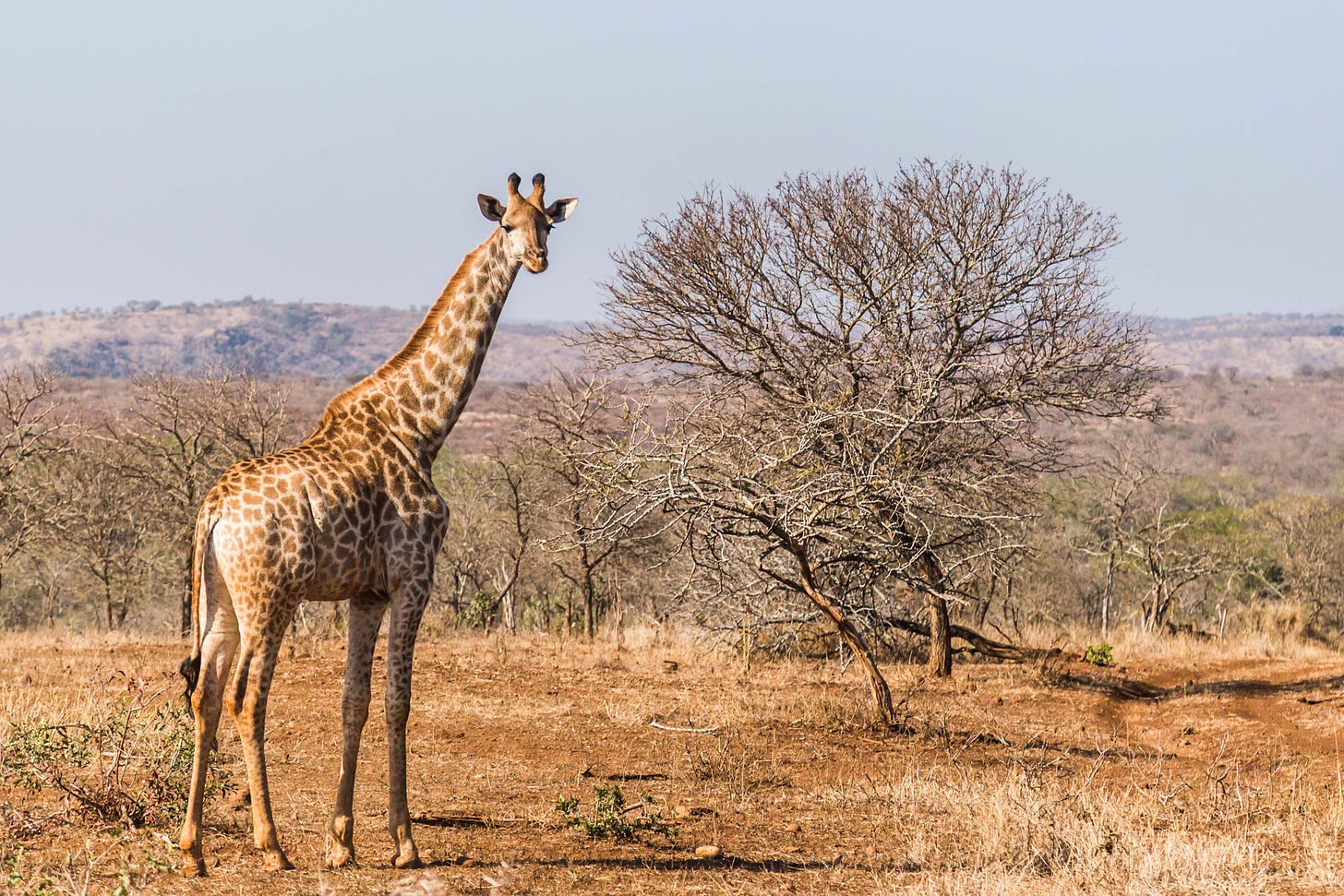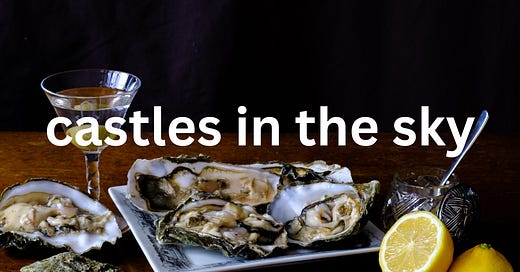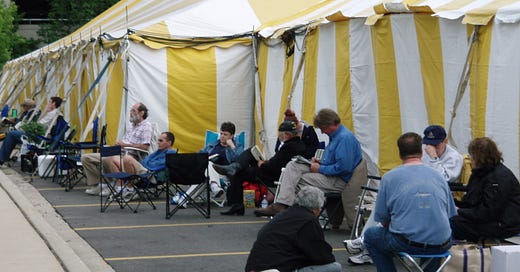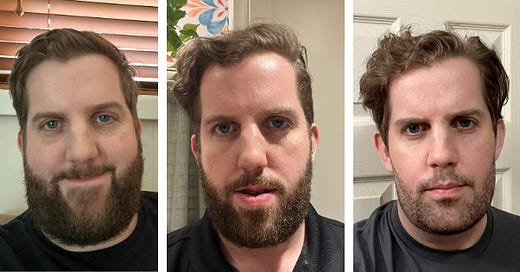
Discover more from Castles in the Sky
The Masculine Urge to Visit a Psychic Giraffe in Khartoum
Fiction | Magical Realism Short Story #2 | Castles in the Sky #8
Note from Charlie: In 2024, I’ll be writing a lot more fiction. This is a story I wrote in early 2022 inspired by the Twitter Account Magic Realism Bot, specifically this Tweet. I plan on revisiting these characters and this world so I wanted to share it with the 1,000+ Castles in the Sky subscribers who have not seen it yet.

Sami pushed a sheep aside so he could lay down, then said, “at first, I thought: I’ll get to the oasis, I‘ll see the giraffe, and I will just know how I die.” He closed his eyes and turned away from me then said, “as it turns out, it is much more complicated than that.” He was asleep in moments. The Sudanese desert stretched infinitely in every direction and I laid back, unable to avoid my thoughts.
A month ago, I was in a lawyer’s office with the former love of my life.
After I signed the divorce papers, I walked outside and just kept walking. Eventually, I found myself in an Uber to the airport, a flight to New York, a flight to London, a flight to Paris, and a bus to Barcelona. I stopped in Barcelona because a girl in my high school said she had visited and that “Bartha”--the nickname Spaniards give Barcelona–had “freed her.”
I wanted to be free. I thought people there were free. Turns out, they weren’t free. Life was just a little slower. I had sold everything I owned and wired the money to London, but didn’t claim it because I didn’t want to be found.
“Wherever you go, there you are,” my grandfather had said when I told him in high school about “Bartha.” He was larger than life, and always where he was. I didn’t meet him until I was almost sixteen. My mom had run away from him when she was sixteen because my grandfather drank and yelled too much. He had run away when he was fourteen because my great grandfather drank and hit too much. My great grandfather ran away when he was twelve because his father drank too much one night and pulled a pistol on him.
My Mom didn’t drink, and so I made it to my thirties until I ran away.
I had started Bartha in a hotel but as the cash I brought with me dwindled I downgraded to seedier and seedier rooms, until finally I was sleeping in a hostel that was really just three bunks and some hammocks in a spare room above an old garage. Lucía, the proprietor, was a woman ten years older than me who inherited the building when her father, the mechanic, died. A little over ten years ago, the garage had fallen into disrepair. Lucía, her fiance, and her best friend had taken a trip together, but she woke up one day to find that her friend and fiance had run off together without her. That evening, she discovered that their car had been clipped and careened into a tree, killing them both instantly. I got along with Lucía so well that she let me stay in the hostel when I completely ran out of cash. We were both running away from something. I had actually run to a new continent while she was in the building she grew up in. In the end, we both ran to the bottom of the bottle, two people whose happy futures had been severed prematurely.
The day I met Sami started like any other day in the hostel. I was asleep on the floor when the throbbing in my head started to sync with the bass coming from the garage. I stumbled downstairs to find Lucía with a half drunk wine bottle in hand, smoking a rolled cigarette, shuffling to “Danza Kuduro”. Blacked out once, she told me it was her fiance’s favorite song. It was the only thing she ever said about him except to tell me how he died. My Spanish was still awful but I could sing the song phonetically, as she played it every morning on repeat through at least the first bottle of wine. Hostel occupants rarely complained, because if you slept above the garage you really had no other place to go.
As she passed me the bottle, Lucía shrieked, looking at the door. I turned and in the doorway was a tall, rangey man with a guitar on his back. He looked like a young, thin Bedouin Marlon Brando. He danced all the way in while singing, “Oi, oi, oi, oi-oi, oi, oi,” and snatched the bottle out of Lucía’s hand before spinning her and taking a big swig. Lucía laughed more than I’d seen her laugh in the almost year I’d been coming down for the morning ritual.
“Sami!” The man said as an introduction, extending his hand to shake mine. He was still moving his hips and feet, and I wondered if I shook his hand if he might pull me up to dance, too.
“Don’t mind him,” Lucia told Sami and pulled him away from me. They knew each other. She turned the music down and another bottle materialized from nowhere. “So what is it this time, Sami? Walk backwards to Tibet? Seduce a Habsburg heiress? Touch every banana in Brazil?”
“No, be serious!” Sami said, grabbing the second bottle from Lucia for a drink. He looked to her, then me, then back to her, and motioned for us all to get closer. We sat around Lucia’s table.
Sami breathed slowly through his nose and looked at both of us, deadly serious, then said, “there is a giraffe in Khartoum that tells the future–IF you bring it a suitable gift.” He slithered across the room like a spy and quietly poured himself a glass. Then told us, who he clearly thought of as conspirators, “I have come back to Barcelona because I understand that the giraffe loves Marzipan. I am going to ask the giraffe how I will die.”
Lucia laughed and said, “of course.” She looked to me. “Last time Sami was here, he was on his way to Tierra Del Fuego, to find an old woman who owned a dragon tooth fossil. The year before, he stopped through because he heard there was a tomb in Ireland with a magic song.”
“It wasn’t magic!” Sami said. “It was a song whose notes compelled others to do your will. St. Cecilia taught it to St. Patrick, and it was how he rid Ireland of the snakes.” Sami took a long pull of the wine then pulled out his guitar and played a dozen notes that could only be described as a flamenco jig. He looked at me, eyebrow raised and said, “there were a few notes missing. You must think I’m a little crazy.”
The words came out of my mouth faster than I could conjure up questions or doubts. “I want to go with you.” Lucia feigned shock for a day that I would leave so suddenly, but we both knew our time together was a pleasant conversation between two people in line to get into the same place: short, distracting, meaningless.
I followed Sami as he busked across Barcelona. A few times we narrowly escaped fines and capture from the authorities, as Sami never had a permit to play music publicly. He also never wore shoes. He always wanted to dance. He would eat off strangers’ plates. He was paranoid in ways that inspired paranoia in others. He was intoxicating to listen to but infuriating to argue with. He was highly logical but all of his premises were false, outright bullshit, things he misheard, and things he just plain made up. He would burp and fart and laugh like a horse after he ate or drank anything. He had an annoying habit of noting any negative emotions he sensed in you. He would not have fit in anywhere. But that did not matter, because he had a mischievous smile, kind eyes, and he could sing or play anything on his weather-beaten Spanish guitar.
In the tourist areas, he played a lot of things you’d expect for a street performer in Spain. “Bamboleo” was a big hit. He would scream the chorus so loudly that his raspy voice would cut through all the other noises in the area. Anything by the Gypsy Kings would make at least 20 Euros if the crowd was big enough. He had an encyclopedic repertoire of songs: music in every language from every era. Traveling with him was a musical education.
For the big crowds he would play pop, but for the subway cars and train stations he would play deeper cuts to get people’s attention. In Marrakech he improvised a forty minute set where he wove through Amr Diab, Guns N’ Roses, Jay Chou, Joan Armitrading, and Manu Chao all the way to close with Hallelujah by Leonard Cohen, backed by Flamenco-style fingerpicking.
By the time he finished there was a woman crying who emptied her purse into the guitar case on the floor. When she turned to run away I realized I was crying too. Sami looked at me and furrowed his brow, then said, “hey man, I need to shit. We have enough money now! Watch the guitar case.”
I hadn’t realized Sami had a goal for the money in his head. I thought to ask him what the number was, or what the money was for. I didn’t, because I knew it was at least as likely he would tell me about why he never handles paper money because people are collecting his DNA, or about how numbers are innately meaningless because base-10 mathematics comes from when the European enlightenment thinkers misread the Arabic philosophers.
I hardly drank the entire time I was Sami’s guitar case holder. Once we crossed into Africa though, I was back to sneaking whatever liquor I could find and drinking it slowly all day. There was a lot less busking, just half-sleeping in various trucks listening to Sami speak Arabic.
Things fell apart when we made it to Libya. One morning we stumbled out of a hostel and jumped in the back of a van after Sami haggled with someone in Arabic. Sometime in the late afternoon, Sami shook me awake from my moonshine nap as the truck rapidly halted. We got out on the side of the road and the truck driver screamed something at Sami then drove off.
After an hour we found some shade along the road and sat in it. Sami spoke without looking at me. “We didn’t have enough money. The number I had was wrong. You can never trust numbers.” He then began a long story about a Russian woman he had met once who told him about Rasputin and the ‘dark mathematics.’ I sipped my Libyan moonshine out of a beat up water bottle. Sami suddenly jumped, “where is it?” he screamed.
I pulled a palm-sized package out from the front of my shirt and unfolded cloth and wax paper to reveal a zipped plastic bag.
“The Marzipan, good.” Sami sat back down and fell asleep under the shade. At night another car came by that gave us a ride into the next town, where Sami found us work. A shepherd wanted to sneak away to see a woman so we were to sleep with his flock for the night.
I looked to Sami, asleep next to the sheep he just pushed. I thought to myself, “How could this not be complicated? We were going to see a giraffe that could tell us the future.” I was on the run, ready to welcome any future that would deliver me from my past. I followed Sami because he seemed to always be running toward something, which felt better than running away. Sami found us a ride into Khartoum the next day.
We walked all over Khartoum for days. Sami said he would recognize the house when he saw it. “Someone in Reykjavik showed me a picture of it.” I had tried in vain to ask the few English speakers I met if they knew of a house with a giraffe, but none did.
I was becoming afraid. I had stopped being afraid after I started drinking and stopped trying to keep my life together. With nothing to lose you have nothing to fear. The giraffe gave me hope though. And suddenly I was under assault from invasive reminders of the failed life I had left behind. So the search for the giraffe became more important with every passing moment. I began to fixate on it. One store had an area for tourists with a postcard with a giraffe on it. I bought one of the postcards and would carry it with me. I would keep thoughts of my past at bay by pulling the picture out to look at it. Within a couple days I had pulled it out hundreds of times. It was crinkled and my sweat had worn off much of the picture. I began to panic, searching stores for a similar picture until one of the store clerks sold me a bottle of moonshine out of view of other customers.
I was more or less blind drunk for the next three days. When the bottle ran out on the fourth day, I could barely walk from the headache, but early in the day Sami stopped me. “That’s it!” He pointed to a house at the end of the street with an unassuming blue gate. He ran to it and I hobbled after him. He knocked on the gate and rattled the windows for a minute but nobody answered. He went to the neighbor’s house and spoke to someone in Arabic. “They said nobody lives here any more.”
Back the way we had come, Sami found an alleyway between two shops with a spot wide enough for us both to sit obscured from the street. “We will wait here until dark,” he said. My headache persisted into the night. I tried to eat and drink but could not keep anything down. Sami lost patience with waiting and we started circling the block until twilight, when we went back to the house and Sami asked me to boost him over the front gate. Inside the house it looked empty and abandoned. I stayed where we had entered while Sami raced through the rest of the house, then motioned me to walk through the back door with him. There was nothing in the backyard except another small shed. “This way,” Sami said. And we went through the shed to the other side. On the other side of the shed was an impossibly large courtyard. I walked back through the shed to make sure I hadn’t turned myself around somehow, but I hadn’t.
The courtyard should not fit–we had circled the block and the courtyard seemed larger than the block that contained it. In the courtyard lay an oasis, with bushes, a small pond, and trees. I did not see it until Sami tugged on my arm, but there it was: the giraffe, standing in the pond with the bright moon behind its head. Sami snapped his fingers and I fumbled the package out of my shirt. He slid over toward the pond in front of the giraffe, unwrapped the Marzipan, and held it out.
For an eternity, nothing happened. The giraffe stood with the moon as a halo and Sami stood in front, arms outstretched above his head. The tableau was serene, surreal, holy, and ridiculous. Finally, the giraffe bent down to sniff the marzipan, and nudged it with its face. It went back up chewing.
Sami took one knee. “How will I die?”
Another eternity, another absurd tableau. The giraffe shifted its weight and slid one foot across the ground in front of Sami.
Sami studied the ground. “Thank you,” he said, and got up.
Sami left the Marzipan and walked over to me. “We can go.” he said. I was too stunned to object. Now that we had caught what were chasing, I wasn’t sure what to do. I followed Sami out through the shed, over the fence, and we were several blocks away before I managed to ask, “What happened?”
“The giraffe is a fraud.” Sami said. He looked at me and grimaced like I should have been able to keep up. “When I asked how I die, it slid its leg over the sand. In the lines in the sand, it had written ‘choke,’ in Arabic, obviously.” Sami chuckled and dipped his head as if I should understand.
“The giraffe can write?” I asked.
“I don’t know,” Sami says. “It probably is already written there, or that’s the only thing it knows how to do. It’s a fraud.”
I walked for several blocks. The sun had come up and we arrived at a busy commercial square. My mind was congested with questions and I was unable to get one out. A Marzipan-eating giraffe that could write? In Khartoum? After I turned dozens of questions over in my mind, the one that slid out was, “How do you know it was a fraud?”
Sami laughed. “I know how I’m going to die. A Roma woman in Hungary told me. I wasn’t sure about her but a Pagan in Sweden told me the same thing.” He laughed again as if it was the most obvious thing in the world. “Choking! Ha!” He was laughing so hard he was crying. Finally, he looked at me. “I bet you could use a drink, huh.”
I looked at Sami. He was off to another adventure. Was he running to something or from something? I thought the latter. I think I had been wrong this whole time.
“Actually Sami, I want to get out of Khartoum.”
“Sounds good.” He scanned the square. “I will grab some food and you can go to that building there. It looks like they handle passports and make travel arrangements.” Sure enough, he was pointing to a building that, along with all the Arabic signage, had the word ‘TRAVEL’ in English above one window.
We walked in the same direction and Sami turned to me. “You are from the States, yes?”
“Yeah,” I said.
“I have never been to the Western hemisphere, but a funny thing happened on the train to Barcelona. I met a German backpacker. He spent time in the Caribbean and told me of Voodoo? Have you heard of this?” He paused and I said nothing. “Well, we will go to Haitia or Dominica next. It sounds like there is much power in this Voodoo.”
“With what money?” I asked.
We stopped at the front of the store with the TRAVEL sign, and Sami pulled a pouch out of his pocket. “These are some things I found in the house with the giraffe.” He opened the pouch to reveal money and jewelry. He pulled a beautiful watch out and handed it to me. “The first part of your share!” He grinned. “Anyway, we can start at Morocco!” And he bounded away to the restaurant.
I entered the store and a man who had been watching us greeted me in English. “Hello, friend. First time to Khartoum?”
“Yes.”
He came around to the front desk. “Did you find what you were looking for?”
“No,” I said, looking around. “I don’t think I did.”
“Well, my friend, what can I do for you? Beach? Pyramids? Hire a car? Anything you need.” He paused. “I hear your friend say Morocco? Is that where you want to go?”
“Maybe,” I said. He put some brochures in front of me, and I looked at all the places I could go. I put the watch on the counter and thought of all the different ways I could keep running away. All the different places I could run toward with Sammy. I thought of my mother, my ex-wife, my grandfather. “Wherever you go, there you are,” I heard myself say.”
“Excuse me?” The man asked.
I held up the expensive watch as an offer. “How close will this get me to London?”
Subscribe to Castles in the Sky
Loosely bookish essays and fiction to inspire curiosity and self-discovery
















God I love this story. You write with soul.
That's a poignant note on life you've got here, Charlie!
"My mom had run away from him when she was sixteen because my grandfather drank and yelled too much. He had run away when he was fourteen because my great grandfather drank and hit too much. My great grandfather ran away when he was twelve because his father drank too much one night and pulled a pistol on him.
My Mom didn’t drink, and so I made it to my thirties until I ran away."